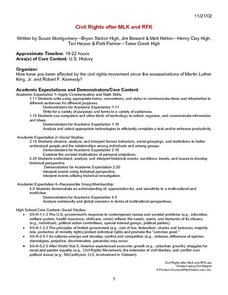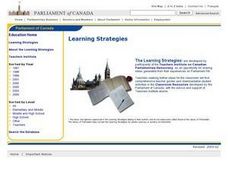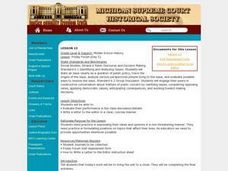Curated OER
Immigration Reform: Understanding the Issue From Different Points of View
Students examine the topic of immigration reform. They conduct research on groups representing various viewpoints on immigration, write and perform a role-play, and write a persuasive essay or letter to a state senator on their views of...
Curated OER
Denial on Trial
What is the "Faurisson Affair”? What is “Holocaust Revisionism”? What does freedom of speech entail? Do revisionists have a right to voice their ideas? Such questions are at the heart of a richly detailed, thought provoking lesson...
Curated OER
Justice Is Blind, Colorblind That Is
It's so interesting to see kids respond to articles about education. To start the day, prompt learners to discuss the words colorblindness and diversity. Then, split your class in two and have one side read an article from 2007 and...
Curated OER
Editorial Writing: What's On Your Mind
Students write an editorial column for a newspaper. For this journalism lesson, students discuss and analyze editorials in print and broadcast media. Students will compare the differences in these two formats of editorial...
Curated OER
Civil Rights after MLK and RFK
Students are assigned to groups representing minority populations who produce a research project in a digital format from the list. A few of the choices are: speech, letter to the editor, editorial cartoon, etc.
Curated OER
Newspapers
Middle schoolers create a class newspaper about the Olympics. In this newspaper lesson, students discuss the basic characteristics of each component of the newspaper. Middle schoolers work in small groups to complete stations...
Curated OER
Loyalists
Students explain why some colonists remained loyal to England during the American revolution. In this social studies instructional activity, students write a letter to an editor about their reasons for remaining loyal to England.
Curated OER
It's Debatable!
Students examine the basic elements and vocabulary of debating. They research an issue and write a letter to the editor of the local newspaper, and role-play a Parliamentary debate on a particular bill.
New Bedford Whaling Museum
A New Bedford Voyage!
A thorough set of activities, articles, and reference material can enlighten your class about the history of whaling in New England. Kids travel back to a time when whale products were valuable and hunting whales was a way to help the...
University of Pennsylvania
Decoding Propaganda: J’Accuse…! vs. J’Accuse…!
Reading snail mail is a great way to go back into history and to understand others' points of view. The resource, the second in a five-part unit, covers the Dreyfus Affair. Scholars, working in two different groups, read one letter and...
Curated OER
Writing for Different Audiences: A Discussion of Cover Letters And Resumes
Students examine the process of writing a resume. They identify examples of casual and formal language, read an article on writing resumes, discuss key questions, write a resume, and discuss and edit another student's resume.
Curated OER
Voice
In these writing style worksheets, students practice developing their writer's voice. Students complete three activities that help them with their writing voice.
Curated OER
It's Your Opinion
Everyone has a different opinion about the characters they read about in books. Have your class explore forming an opinion and finding evidence to support it as they read and discuss what they think about a particular character. They...
Curated OER
"No News Like Ancient News"
Want to know more about Ancient history? Young historians will read a minimum of two web sites to complete the chart "Residents of Olympus". They choose one Greek god or goddess to research. This could be a small group activity or...
Curated OER
Pig Products
How do you feel about cloning? This issue is highly debated, so educate your class before they participate in a similar debate! Read a New York Times article related to the use of cloned pig organs for human transplants. Groups develop...
Curated OER
Writing Prompts: Prose, Pamphlets and Poems
Students practice reading an atlas and writing prompts. They use graphic organizers to construct their writing prompt. They use the Internet to do their research.
Curated OER
Capitalization of Nouns
Which nouns are capitalized? Challenge young editors with these erroneous sentences, all of which require capitalization. After circling all the necessary capitals in 10 sentences, they rewrite two sentences (which are all in capital...
TCI
Celebrating Our Constitution
School House Rock's "Preamble" launches a study of the Preamble of the US Constitution and the relevance of this 200 year-old document today.
Curated OER
The Gentle Art of Persuasion: Techniques for Persuading Different Audiences
Students examine the use of persuasive arguments to varying audiences. They define persuasion, read and discuss an article on whether P.E. should be optional, summarize the pros and cons of P.E., and write a letter or a speech.
Curated OER
A Slave No More
Learners discover what it was like to cross into freedom. In this slavery lesson, students read the "Emancipation Proclamation," and letters written by Abraham Lincoln and John Washington (a former slave). Learners identify the key ideas...
Curated OER
In My Honest Opinion
Learners explore the function of letters to the editor for both a newspaper and its readers. They select a current event about which he or she feels strongly, reads a related New York Times article and responds to it in a letter to the...
Curated OER
Aruba Cloud Cover Measured by Satellite
Students analyze cloud cover and compose written conclusions to a given related scenario. Students submit a letter of response and a report detailing their calculations and conclusions.
Curated OER
What Did You Say?
Twelfth graders identify main ideas in reading selections. They read newspaper letters to the editor, identify the main ideas, list the supporting details, and present each side of the issue to the class.
Curated OER
Friday Forum (Day 5)
Students evaluate their performance in different debates about the laws of Michigan. They write a letter to an editor of a newspaper sharing their opinions. They write journal entries as well.

























